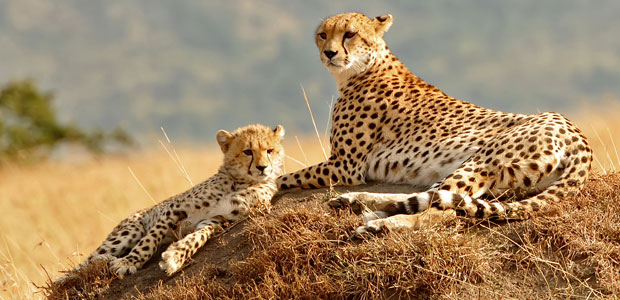Advertisement
Wildlife Wednesday: Cheetah
Why should you never play card games in the savannah? Because of all the cheetahs! On this Wildlife Wednesday, we’re learning (and cracking terrible jokes), about the world’s quickest kitty. Habitat Cheetahs can be spotted throughout much of Africa, with their current range stretching from Algeria and Niger to Somalia and Kenya. You can even … Continued

Why should you never play card games in the savannah? Because of all the cheetahs! On this Wildlife Wednesday, we’re learning (and cracking terrible jokes), about the world’s quickest kitty.
Habitat
Cheetahs can be spotted throughout much of Africa, with their current range stretching from Algeria and Niger to Somalia and Kenya. You can even catch a glimpse of one subspecies, the Asiatic cheetah, as far east as Iran.
Trivia
- What do you call a group of cheetahs? A coalition. No joke!
- Generally, you’ll see more coalitions of males than of females. While the females only live in groups when they have young, males normally live in permanent groups of two to four members.
- What’s a cheetah’s favourite food? Fast food! Prey most often consists of gazelles, impalas, and other small and hoofed animals, but can also include ostriches, porcupines, rabbits, and birds.
- Cheetahs are great sprinters. They have a flexible spine to help them stretch their front legs very far forward and claws that don’t sheath to act like cleats. This makes them really good at catching a quick meal.
- These flighty felines, however, aren’t endurance runners. They can maintain their top speed of about 64 miles per hour (103 km per hour) for only a few moments.
Why are they threatened?
A huge number of different factors threaten wild cheetah populations—most of them, however, are the fault of people.
In East Africa, the loss and fragmentation of their habitat is considered the primary threat. Since cheetahs require vast hunting range and live in such low densities, the majority of the area’s existing protected areas just aren’t big enough.
In North Africa and Iran, a major concern is the diminishing numbers of the cheetahs’ main food source—small, hoofed herd dwellers. As a result, the cats are turning to domestic herds for a meal and are considered a menace by farmers.
In South Africa, cheetahs are also facing persecution from farmers and ranchers even though they cause very little damage to domestic herds there.
Throughout their range, the cats also face threats from snares left for other species, and capture or death from hunters (Botswana, Zimbabwe, and Namibia allow limited capture and hunting of the animals).
Their own daytime hunting can also be disturbed by overzealous tourists looking to snap a photo of the world’s quickest cat.





